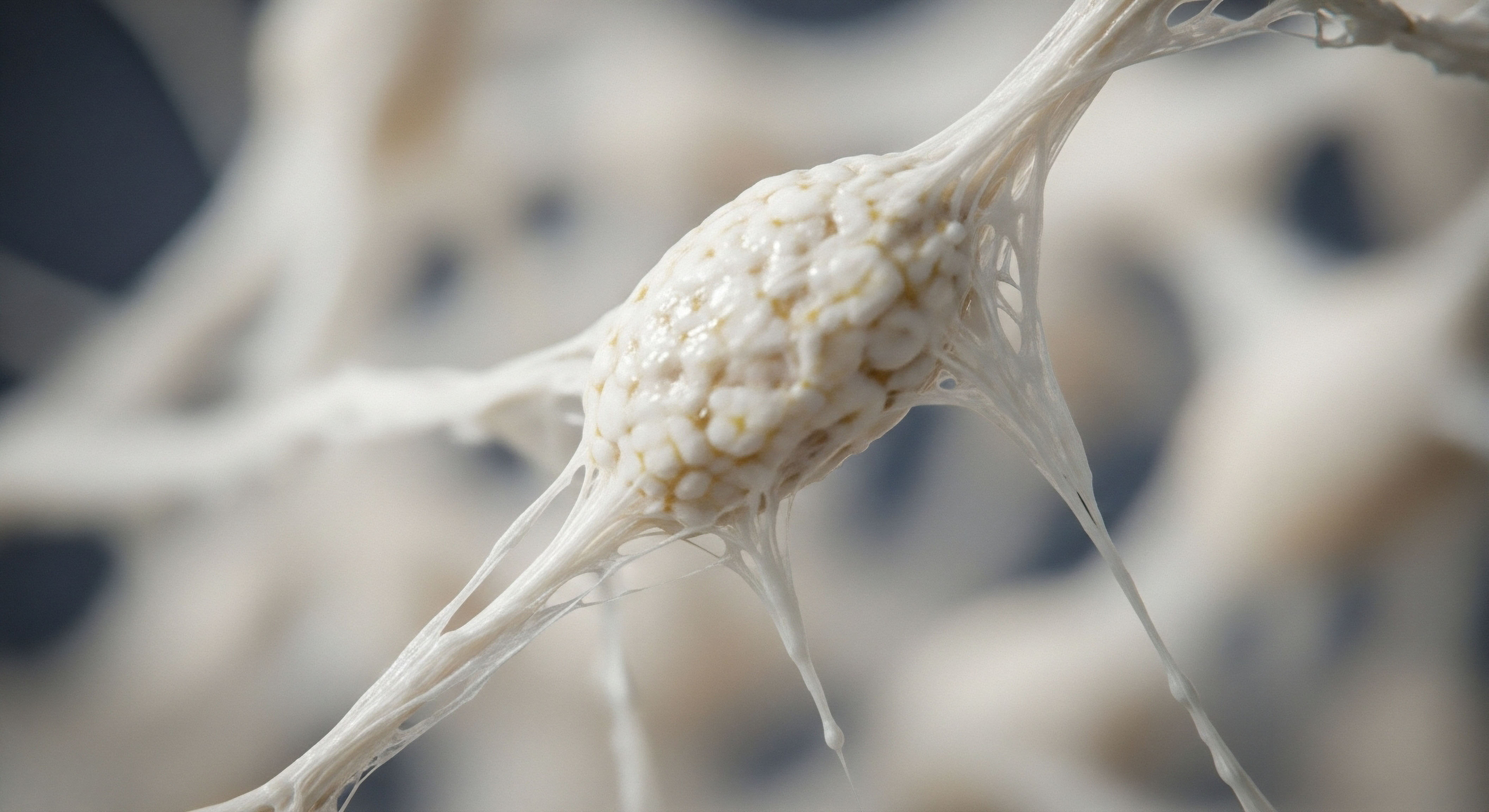

The Unseen Architects of Human Capacity
The pursuit of peak performance and enduring vitality defines a select few. This ambition demands a deeper understanding of the body’s intrinsic operating systems. Within this intricate biological machinery, hormones stand as fundamental control signals. They direct growth, govern metabolism, modulate mood, and orchestrate the very rhythm of life. To overlook their profound influence constitutes a forfeiture of inherent power.
Consider the endocrine system as a sophisticated network of internal communication. Each hormone transmits specific instructions, influencing cellular function across every tissue. Optimal hormonal balance dictates energy production, muscle synthesis, fat regulation, and cognitive sharpness. Deviations from this precise equilibrium manifest as a spectrum of challenges, from persistent fatigue and declining physical prowess to diminished mental acuity. These are not isolated symptoms; they represent systemic alerts, signals that the body’s core programming requires re-evaluation.

Beyond Baseline ∞ True Physiological Command
Many accept a gradual decline in function as an unavoidable consequence of aging. This perspective fundamentally misinterprets biological potential. Scientific progress now offers a pathway to actively recalibrate and restore these vital hormonal signals. We move beyond merely correcting deficiencies; we sculpt a physiology capable of exceeding conventional expectations.
This involves understanding the intricate feedback loops, such as the hypothalamic-pituitary-gonadal (HPG) axis, which governs sex hormone production, or the thyroid axis, controlling metabolic rate. Fine-tuning these systems allows for a profound impact on overall well-being and output.
Data indicates that optimizing testosterone levels in men can enhance cognitive function and reduce body fat, reflecting a significant impact on performance metrics.
The implications extend beyond physical strength. Hormonal status directly influences neurochemistry, shaping mood stability, motivation, and cognitive processing speed. A body with balanced hormones performs with greater efficiency, recovers with superior speed, and maintains mental clarity under pressure. This translates into a competitive advantage, a sustained edge in demanding environments, whether in the boardroom or on the training ground. The foundational science confirms the direct link between hormonal health and the tangible metrics of human performance.

The Deep Current of Longevity
Longevity science increasingly highlights the interconnectedness of metabolic and hormonal health with healthy aging. Maintaining youthful hormonal profiles does not simply mask decline; it supports cellular resilience and mitigates age-related systemic wear. The proactive management of hormones serves as a strategic intervention against the entropic forces of time. It fortifies the very structure of biological existence, supporting sustained function and vigor well into advanced years.
- Testosterone and DHEA influence muscle mass, bone density, and mood.
- Thyroid hormones regulate metabolism, energy, and body temperature.
- Growth hormone and IGF-1 support cellular repair and regeneration.
- Estrogen and progesterone impact reproductive health, bone health, and cognitive function.


Precision Engineering for Biological Ascent
The path to hormonal optimization demands meticulous assessment and a strategic approach. It begins with comprehensive diagnostic panels, moving beyond standard blood work to analyze a full spectrum of biomarkers. This includes not only total hormone levels but also free and bioavailable fractions, precursor hormones, and downstream metabolites. Understanding these nuances provides the precise data required to construct an individualized optimization protocol. The body responds to targeted interventions, much like a finely tuned machine requiring specific adjustments for peak operation.
Advanced therapies form the core of this strategic recalibration. Hormone replacement therapy (HRT), when applied with clinical rigor, replaces or supplements hormones to restore physiological balance. This involves carefully selected compounds and precise dosing schedules tailored to individual metabolic responses. Peptide science offers another sophisticated avenue, utilizing signaling molecules to direct specific cellular processes. These agents can stimulate endogenous hormone production, support tissue repair, or modulate metabolic pathways, providing highly specific biological directives.

Strategic Interventions and Modalities
Consider the impact of testosterone replacement therapy (TRT) for men experiencing age-related decline. This intervention aims to restore levels associated with youthful vitality, influencing muscle mass, bone density, libido, and mood. The selection of specific esters and delivery methods, whether injectable, transdermal, or implantable, determines the pharmacokinetics and steady-state levels achieved. Similarly, women can benefit from bioidentical hormone replacement to address perimenopausal and menopausal changes, preserving bone health, cognitive function, and quality of life.
A study on growth hormone-releasing peptides demonstrated a significant increase in endogenous growth hormone secretion, indicating their utility in age management protocols.
Peptide protocols represent a frontier in targeted biological modulation. Compounds like Sermorelin or Ipamorelin stimulate the body’s natural production of growth hormone, supporting recovery, body composition, and cellular regeneration. Other peptides address specific needs, such as BPC-157 for tissue repair or PT-141 for sexual function. These agents interact with specific receptors, initiating cascades of beneficial biological effects. The precise application of these tools demands a deep understanding of their mechanisms and interactions within the broader endocrine system.

Foundational Support for Systemic Health
Optimization extends beyond direct hormonal intervention. A robust foundation of metabolic health supports the efficacy of any protocol. This involves a highly personalized nutritional strategy, prioritizing nutrient density and metabolic flexibility. Targeted supplementation, based on individual micronutrient status, addresses specific cellular requirements. Structured exercise, incorporating resistance training and cardiovascular conditioning, acts as a powerful endocrine modulator.
Quality sleep, often overlooked, represents a non-negotiable component of hormonal regulation and recovery. These foundational elements act in concert, creating an environment where the body can express its full optimized potential.
| Intervention Type | Primary Mechanism | Key Outcomes |
|---|---|---|
| Hormone Replacement Therapy | Exogenous hormone delivery to restore physiological levels | Enhanced energy, improved body composition, mood stability |
| Peptide Therapy | Stimulation of endogenous hormone production, targeted cellular signaling | Tissue repair, growth hormone secretion, metabolic regulation |
| Metabolic Optimization | Nutritional precision, targeted supplementation, structured exercise | Improved insulin sensitivity, enhanced energy production, systemic resilience |


Your Future Self, Designed Today
The commitment to hormone optimization yields tangible results, often unfolding with a deliberate progression. Initial improvements frequently manifest as heightened energy, enhanced mood, and improved sleep quality. These foundational shifts establish a new baseline of well-being, paving the way for more profound physiological transformations. Sustained adherence to a personalized protocol translates into visible changes in body composition, including increased lean muscle mass and reduced adipose tissue. Cognitive function sharpens, marked by greater focus, clarity, and mental resilience.
This is a long-term strategy for sustained excellence. The immediate benefits are compelling, yet the true power lies in the cumulative effect over months and years. Consistent hormonal balance supports cellular integrity, reduces systemic inflammation, and fortifies metabolic pathways.
This proactive stance significantly impacts the trajectory of aging, allowing individuals to maintain peak physical and mental faculties far beyond what conventional wisdom suggests. The goal is to create a future where vitality remains an inherent state, not a fleeting memory.

Claiming Enduring Vitality
The decision to pursue hormone optimization marks a pivotal shift in personal health philosophy. It represents a declaration of intent to command one’s biology, moving beyond passive acceptance of decline. This is an investment in a future defined by sustained performance, robust health, and an undeniable edge in every aspect of life.
The commitment transforms health from a reactive endeavor into a proactive pursuit of mastery. Individuals who embark on this path report a profound sense of reclaiming agency over their physical and mental state.

The Strategic Mindset of Mastery
Achieving this level of biological command demands a strategic mindset. It requires consistent monitoring, regular re-evaluation of biomarkers, and an openness to protocol adjustments based on individual response. This iterative process refines the approach, ensuring sustained optimization. The integration of advanced diagnostics with a deep understanding of physiology creates a feedback loop for continuous improvement.
This is not a static destination; it is an ongoing journey of refinement, a constant pursuit of biological perfection. The reward is a life lived with an unparalleled degree of energy, clarity, and physical capability.

The Inevitable Command of Biology
The era of passive health management concludes. We stand at the precipice of a new understanding, where human biology becomes a system to master, not merely to maintain. Hormone optimization provides the key to unlocking latent capabilities, transforming the very essence of human experience. This is the future of human potential, available today.

Glossary

vitality

endocrine system

hormonal balance

longevity science

growth hormone

cognitive function

peptide science

cellular regeneration

body composition




